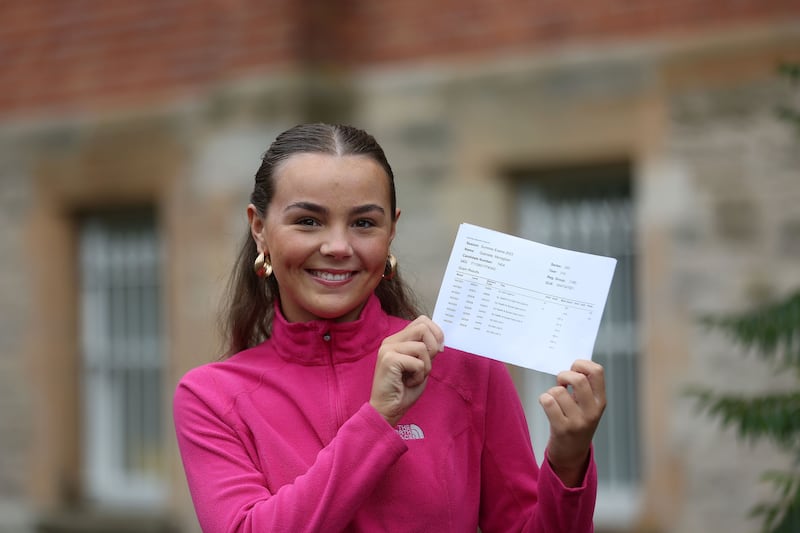ANOTHER record-breaking year of A-level results has seen more than half of entries in Northern Ireland awarded the top A* or A grades.
But amid the celebrations, there are fears universities may now become overwhelmed with more applicants with the required grades than there are places available.
Thousands of students across the north yesterday received teacher-assessed grades following the cancellation of exams for the second year in a row.
Some 15.8 per cent of students achieved the top A* grade - a 2.3 percentage point increase from last year.
Those receiving A*-A also increased by 7.5 percentage points to 50.8 per cent.
It also marks a significant rise from 2019 - when exams were last held - when 32.2 per cent were awarded A*-A.
There was a slight decrease in those receiving grades A*-E to 99.4 per cent, compared to 99.8 per cent last year.
The cancellation of formal exams due to the pandemic saw grades assessed by teachers and decided via a five-stage process.
This did not include the statistical algorithm used last year to standardise results which sparked outrage after more than a third of grades predicted by teachers were reduced.
An outcry from teachers, parents and pupils led to the original teacher assessed grades being issued.
A total of 25,468 students entered AS and A-level qualifications set by the north's exams body CCEA this year - an increase of 3.8 per cent.
Those achieving a top A or A* grade increased for both males and females, with a 7 per cent and 7.9 per cent increase respectively.
Some students also received BTec results, which for many is a path into university.
Education minister Michelle McIlveen praised young people's "incredible resilience", acknowledging the exceptional circumstances they had faced over the past year.
Margaret Farragher, interim chief executive of CCEA, thanked those involved in the process and said "we applaud these students for continuing with their studies in challenging circumstances and wish them well with their future plans".
NAHT (NI) president Dr Graham Gault praised the "hard work and resilience of all our young people" and said "this year has been like no other, and our young people have coped with many uncertainties and challenges".
Education Authority chairman Barry Mulholland said "students have had to deal with continued disruption to their education as we navigate through the Covid-19 pandemic and they should be incredibly proud of everything they have achieved".
However, there are fears around the demand for university places.
For courses such as medicine, dentistry, social work and teaching, there is a risk institutions will now be overwhelmed with significantly more applicants with the required grades than places available.
NUS-USI president Ellen Fearon said it is "imperative that places are made available".
"The government and wider education sector have had a full year to prepare for the outcome of this year's grading process so it's imperative that places are made available to accommodate new students," she said.
"Students have done their part, and it's now on the sector to do theirs.
"This year has offered a perfect opportunity to consider whether our current exam system is really reflective of young peoples' potential.
"Clearly when teachers are put in charge and results are more reflective of students’ ongoing work, they are achieving great standards. We can, and should, use the experience of this year to build a better system, one which is free from inequality and doesn’t place such intense pressure and stress on people at such a formative time in their lives."
Dr Patrick Roach of the NASUWT also said "we cannot afford a repeat of this confusion and chaos for yet another year".
"In looking ahead to plans for qualifications in 2022 the NASUWT has made it clear to ministers and regulators that mitigations and contingency plans will still be needed," he said.
"Such mitigations should include a slimmed down package of subject content and the provision of a choice of subject topics across all subjects and qualifications to help reduce the pressures on pupils and teachers and reflect the impact of the disruption to their learning pupils have faced over the last 18 months.
"Teachers and young people need a system for next year's qualifications which is realistic and responsive to the continuing challenge of the pandemic on students’ education."








